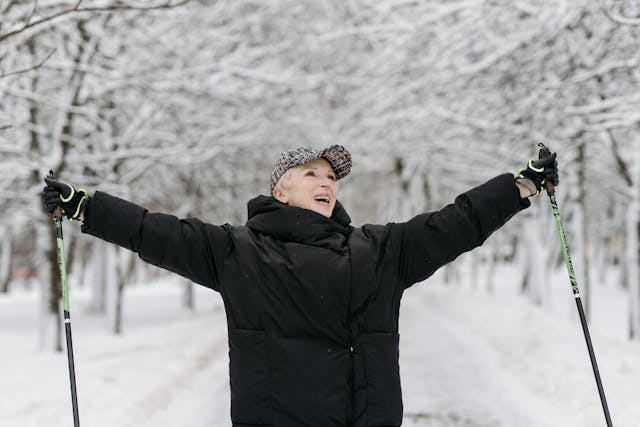- Regularly assessing and adapting support strategies is crucial for allowing seniors to remain independent.
- Maintaining open communication and actively listening to the senior’s needs can help create a personalized care plan.
- Re-evaluating support systems regularly ensure they align with the senior’s changing lifestyle and needs.
- Independence for seniors is not a one-size-fits-all approach, but a personalized and ongoing process.
- Empowering seniors to live on their own terms gives them more independence and recognizes and celebrates their value in our lives.
The notion of growing older often comes with the expectation of relinquishing certain aspects of one’s independence. However, maintaining a sense of freedom and autonomy is vital for seniors’ well-being. It’s an integral part of life that deserves nurturing, even as we age. For families, caregivers, and seniors, finding ways to foster independence can be rewarding and beneficial.
In this blog post, we’ll explore five practical tips for enhancing the independence of seniors. These strategies are designed to integrate seamlessly into the lives of older adults, empowering them to lead fulfilling, self-reliant lives. From leveraging technology to fostering social connections, each tip is a step toward a more independent and vibrant senior lifestyle.
The Value of Independence for Seniors
Independence isn’t just a convenience; it’s a fundamental aspect of human dignity. For seniors, maintaining autonomy can profoundly affect their physical health, mental well-being, and overall quality of life.
Psychological and Emotional Well-being

Seniors who continue to live independently often display higher levels of self-esteem and greater control over their lives. This independence enables them to make choices that align with their values and preferences, increasing happiness and satisfaction.
Physical Health and Longevity
Independent living encourages active engagement with daily life, which can translate to better physical health. Seniors who remain autonomous often lead more active lifestyles, contributing to improved cardiovascular health, strengthened immune systems, and overall longevity.
Sense of Purpose and Fulfillment
Independence can give seniors a greater purpose. When they can manage their own affairs and engage in social and community activities, they often report feeling more fulfilled and connected to the world around them.
Practical Tips for Enhancing Senior Independence
Fostering independence isn’t about removing the need for assistance; it’s about providing support that enables seniors to tackle life on their terms. Here are five practical strategies to promote autonomy among the elderly.
1. Invest in Home Health Care Services
Home health care services offer a range of support, from medical care to personal assistance, all within the comfort of a senior’s own home. This level of care empowers seniors to live where they’re most comfortable, while professionals manage their health needs.
2. Utilize Assistive Technology
The modern world is full of gadgets designed to make life easier, and seniors can benefit greatly from these tools. Assistive technologies, such as smart home systems and mobility devices, can alleviate certain challenges, providing increased freedom in daily life.
3. Adapt the Living Environment
Simple modifications to a living space can significantly enhance its senior-friendliness. For example, adding handrails in the bathroom or a ramp at the entrance can make a world of difference for those with mobility concerns.
4. Encourage Social Engagement
Human connection is a crucial element of a fulfilling life, regardless of age. Encouraging seniors to maintain and build social ties can help combat isolation and its associated health risks.
5. Promote Physical Activity
Staying active is key to preserving independence. Regular exercise can improve strength, balance, and cognitive function, all of which are essential for leading an autonomous life.
Monitoring Progress and Adjusting Support
It’s important to remember that the needs of seniors can change over time. Regularly assessing the effectiveness of the strategies in place and being willing to adapt them is crucial for ensuring that seniors receive the support they need while maintaining their independence.
- Listening to the Senior’s Needs: Maintaining a constant, open dialogue with the senior is the most effective way to understand their evolving needs and preferences. Creating an environment where seniors feel comfortable expressing themselves is a step toward providing personalized, empowering care.
- Re-evaluating Support Systems: Every family and caregiving situation is unique. Re-evaluating the support structure in place regularly can help make sure that it aligns with the senior’s changing lifestyle and needs.
Wrapping Up
The path to independence for seniors is not one-size-fits-all; it is a personalized and ongoing process. By implementing the tips outlined in this post and being open to continued communication and adjustments, families and caregivers can help seniors live life on their own for much longer. It’s not just about giving seniors more independence; it’s about recognizing and celebrating the value they bring to our lives when they are empowered to do so.
